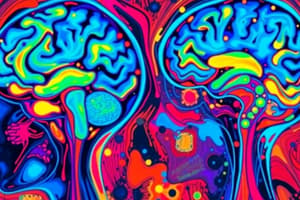Podcast
Questions and Answers
Which technology is commonly used in neuroscience studies to gather information about brain activity?
Which technology is commonly used in neuroscience studies to gather information about brain activity?
- Functional Magnetic Resonance Imaging (fMRI) (correct)
- Electroencephalography (EEG)
- Positron Emission Tomography (PET)
- Magnetic Resonance Imaging (MRI)
What kind of information can fMRI provide in neuroscience studies?
What kind of information can fMRI provide in neuroscience studies?
- Information about brain development
- Information about brain activity (correct)
- Information about brain chemistry
- Information about brain anatomy
What did a specific study from 2008 claim about fear?
What did a specific study from 2008 claim about fear?
- Fear can be seen
- Fear can be heard
- Fear can be tasted
- Fear can be smelled (correct)
What did the actual study from 2008 collect from volunteers?
What did the actual study from 2008 collect from volunteers?
What did the media coverage about the study from 2008 claim about fear?
What did the media coverage about the study from 2008 claim about fear?
Which of the following is the main purpose of using fMRI in neuroscience studies?
Which of the following is the main purpose of using fMRI in neuroscience studies?
What did the media coverage about the 2008 study claim?
What did the media coverage about the 2008 study claim?
What is the main limitation of media coverage about fMRI studies?
What is the main limitation of media coverage about fMRI studies?
What does the text suggest about the usage of fMRI in neuroscience studies?
What does the text suggest about the usage of fMRI in neuroscience studies?
What did the actual study from 2008 collect besides sweat samples?
What did the actual study from 2008 collect besides sweat samples?
Flashcards are hidden until you start studying
Study Notes
fMRI in Neuroscience Studies
- Functional magnetic resonance imaging (fMRI) is a technology commonly used in neuroscience studies to gather information about brain activity.
fMRI Capabilities
- fMRI can provide information about brain activity, including which areas of the brain are active during specific tasks or stimuli.
2008 Study on Fear
- A 2008 study claimed that they had identified a specific area of the brain associated with fear.
- The study collected sweat samples from volunteers to measure fear responses.
- The study also collected fMRI scans to identify brain activity associated with fear.
Media Coverage of the 2008 Study
- The media coverage of the study claimed that the researchers had found the "fear center" of the brain.
- The media coverage was misleading, as it oversimplified the study's findings and implied a more significant discovery than was actually made.
Purpose of fMRI in Neuroscience
- The main purpose of using fMRI in neuroscience studies is to identify which areas of the brain are active during specific tasks or stimuli.
Limitations of Media Coverage
- The main limitation of media coverage about fMRI studies is that it often oversimplifies or misrepresents the findings, leading to misconceptions about the research.
fMRI Limitations in Neuroscience
- The text suggests that fMRI has limitations in its ability to accurately identify specific emotions or thoughts, and that media coverage of fMRI studies can be misleading.
Additional Study Details
- The 2008 study collected not only sweat samples but also fMRI scans from volunteers.
Studying That Suits You
Use AI to generate personalized quizzes and flashcards to suit your learning preferences.




